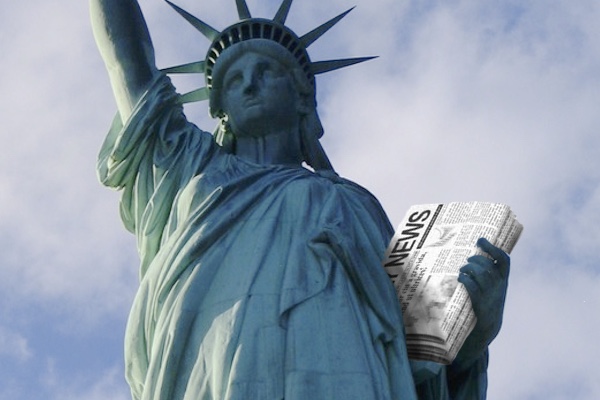Newsflash: The US Senate Has Passed a Resolution Backing Freedom of the Press

The U.S. Senate has put history to work to help protect freedom of the press.
On August 18, the Senate unanimously passed a resolution affirming the vital role of the free press. In something of a rebuke to the president, who continuously attacks the media for peddling "fake news," the resolution "affirms that the press is not the enemy of the people" and condemns attacks on the press as "an attack on the democratic institutions of the United States."
The resolution, introduced by Sen. Brian Schatz (D-HI), Senate Democratic Leader Chuck Schumer (D-NY), and Sen. Richard Blumenthal (D-CT), is an eloquent document. Most press reports emphasized the parts of the resolution that seem to confront President Trump's constant attacks on the media.
But the resolution's real gravitas comes from the eight carefully-selected quotations from American history that the resolution included – four from 18th century founders, two from Republican president Ronald Reagan, and two from the Supreme Court.
The Senate resolution did not provide context or links to the original sources for the quotations. The rest of this post tries to do that.
Four Endorsements from the Founding Fathers
* A young Benjamin Franklin, writing under the pseudonym "Silence Dogood" in an essay in the New England Courant newspaper on July 9, 1722, declared that "Whoever would overthrow the Liberty of a Nation, must begin by subduing the Freeness of the Press." Franklin was later a well-known leader of the American Revolution, statesman, and philosopher.
* Thomas Jefferson, principal writer of the Declaration of Independence, and later President of the United States, in a letter dated January 28, 1786, wrote that "Our liberty depends on the freedom of the press, and that cannot be limited without being lost." He was referring to a political dispute that the newspapers of the day had blown somewhat out of proportion. Despite that, Jefferson reaffirmed the importance of a free press.
* On June 8, 1789, James Madison, principal writer of the Constitution and later President of the U.S., introduced the Bill of Rights to the Constitution, which included the first amendment guaranteeing freedom of the press.
* Madison based the freedom of the press amendment partially on the Virginia Declaration of Rights. That document, adopted by the Virginia revolution convention on July 12, 1776, asserted the right of people to change their government, set forth a number of human rights, and served as a partial basis for both the Declaration of Independence and the Bill of Rights. The Senate resolution presents this quotation from the Virginia Declaration: "The freedom of the Press is one of the greatest bulwarks of liberty and can never be restrained by despotic Government."
Two Endorsements from Ronald Reagan
* Two of the quotations in the Senate resolution are from president Ronald Reagan's proclamation of "Freedom of the Press" day, August 4, 1985 Of course, Reagan, a Republican president, is cited by the Senate in part because he is still popular among Americans today. The first Reagan quotation: "Freedom of the press is one of our most important freedoms and also one of the oldest."
* In the second quotation, Reagan continued that "Today, our tradition of a free press as a vital part of our democracy is as important as ever.... This flow of information helps make possible an informed electorate and so contributes to our national system of self-government."
Two Statements of Support from the Supreme Court
* Supreme Court Justice Anthony Kennedy wrote in a 1992 opinion that "The First Amendment is often inconvenient. But that is beside the point. Inconvenience does not absolve the government of its obligation to tolerate speech." The Senate resolution is sending a subtle message by including this quotation: Kennedy, who recently resigned, was appointed by Ronald Reagan and there is concern about whether President Trump's nominee to replace him, Brett Kavanaugh, will support first amendment rights if he is confirmed.
* The final historical citation in the Senate resolution is to the 1971 Supreme Court decision in New York Times Co. vs. United States. The Senate resolution does not say so, but this was the landmark decision that permitted the New York Times and the Washington Post to publish the then-classified "Pentagon Papers," an internal Department of Defense study that documented the government had misled the American people about the origins and progress of the Vietnam war. The administration of Republican president Richard Nixon had asked the Court to block the publication on grounds of national security. The Court refused, upholding the right of the newspapers to publish the material.
The Senate resolution features a long quotation that included these phrases: "In the First Amendment, the Founding Fathers gave the free press the protection it must have to fulfill its essential role in democracy. The press was to serve the governed, not the governors.... The press was protected so that it could bare the secrets of the government and inform the people. Only a free and unrestrained press can effectively expose deception in the government."
Selecting this case and these words is a message to Trump – and the American people – about the right of the press to expose government secrets. But this quotation is actually not from the Court decision; that was a short statement just affirming the papers' right to publish. Instead, it is from a concurring opinion from two of the justices, Hugo Black and William O. Douglas.
The Senate resolution reminds us that freedom of the press is ingrained in American history. It also shows how carefully-selected citations and examples from history can remind us of the need to protect civil liberties.